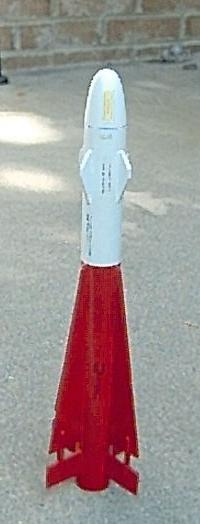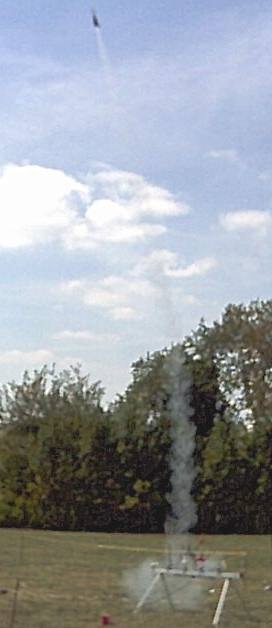| Manufacturer: | Aardvark Rockets |

(Contributed - by Dick Stafford)
 Brief:
Brief:
BT-50 based scale model of the AIM-4C Falcon that flies on 18mm motors and
recovers on a streamer.
Construction:
This kit comes with paper tubes and rings. The light BT-50 body tube appears to
be the same as Apogee's tubing - weight, color, etc. The scale nose cone is
solid plastic and two ballast washers are provided to keep the rocket stable.
You cut the fins from two sheets of basswood and thin strips of balsa provide
the fin details. The recovery system includes a section of Kevlar®
twine, a section of elastic, and a Mylar streamer.
The instructions are pretty good and are more than sufficient to build this kit. The most challenging parts of its construction were cutting the small front fins from the brittle basswood, and aligning the three sets of fins (12 total). I was surprised when I saw calipers mentioned in the instructions. In order to get a true scale model, I suppose, they specify the fin placement to three decimal places! I rounded to the nearest 1/16".
The one problem with my kit was the quality of the basswood. Both pieces were warped and even though I tried to straighten them, the long fins re-warped after being exposed to the carpenter's glue (I used the waterproof variety). Because of the length of the middle set of fins and the way the fin stock was cut, the grain had to be placed perpendicular to the body tube. The long fins not only warped side to side, but the thin front ends also lifted away from the body tube. I managed to minimize the warping by soaking the ends in thin CA and pushing them back in place until they dried.
Finishing:
The basswood had quite a deep grain and required a lot of filling. I used
Krylon primer and paints to approximate the color scheme identified in the
instructions. The kit also includes a full set of decals. These are *very*
small and are not easy to cut out or manipulate.
Construction Rating: 3 out of 5
 Flight:
Flight:
The kit relies on friction fitting the motor. I should have scrounged a motor
clip from the ol' parts bin, but thought of it too late. The recommended motors
for this kit include: EST A8-3, B6-4, C6-5; APO C4-5, C10-7, D3-7, D10-7; AT
D13-7.
Since the wind was fairly heavy, was blowing towards the trees AND this was the first flight of the day, I decided to try a B6-4. The boost was good with some weathercocking but no sign of any wobble. The heavy plastic nose and weights did their job. (Please excuse the poor launch pic, but I just had to include it since it is the first one I've caught.)
Recovery:
I was worried that the provided streamer would not slow the model enough, and
my fears were well founded. I attached the streamer about 8" down from the
nose, as recommended. I noticed that another reviewer suggested another
approach on a similar model the
AA9,
but decided to stick with the instructions. The rocket came down nose cone
first, with the body falling parallel to the ground. One of the rear fins came
part way off, and the struts to the larger forward fins were destroyed. Easily
repaired, but would probably happen again on the next flight. I will probably
try a small chute instead. If I were to build another of these kits, I'd also
add some paper or light fiberglass to strengthen the fin joints.
Flight Rating: 3 out of 5
Summary:
This kit is reasonably priced and the resulting rocket looks great. I was
disappointed at the quality of the fin stock, which did affect the looks of the
final product. It doesn't appear, however, that others have experienced this
problem with the small Aardvark kits. The streamer is insufficient and a small
parachute should be substituted. Despite these problems, I still like the kit
and will consider buying another in the series.
Overall Rating: 3 out of 5
 |
 |